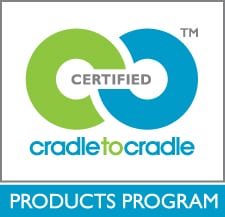SAN FRANCISCO, Oct. 22, 2014 /PRNewswire/ — The Cradle to Cradle Products Innovation Institute has announced it will offer a Material Health Certificate, a tool for manufacturers across industries to communicate their work toward chemically optimized products. The Material Health Certificate marks the first time the Institute has offered reporting of its comprehensive methodology in only one category.
Established in 2006, the multi-attribute Cradle to Cradle Certified™ Product Standard has been widely recognized for its depth, rigor, third-party auditing, and ease of reporting via the certification label. Cradle to Cradle Certified products are assessed in five categories: Material Health, Material Reutilization, Renewable Energy, Water Stewardship, Social Fairness. Now, companies have the option to pursue only the Material Health assessment.
“The high standards are the same, but focusing solely on Material Health allows manufacturers to step on the Cradle to Cradle Certified path more readily and encourages more transparency in their products,” said Bridgett Luther, President at the Institute. “We heard from manufacturers across industries that wanted a depth of understanding in what’s in their product, and how safe those ingredients are for humans and the environment. We answered the call to fill this market need with a well established, rigorous methodology that requires continuous improvement. It’s time to take an aggressive approach to making our products safer for human and environmental health.”
The requirements for the Material Health Certificate are identical to those of the Material Health of the Cradle to Cradle Certified Product Standard Version 3.0 which is governed by the Institute’s Certification Standards Board. The standard requirements for Continuous Improvement and Optimization and Site Visit of the Production Facility must also be met. Accredited assessment bodies that have been trained and audited by the Institute will conduct the assessment; and the Institute will administer the certificates. Once granted, the certificate will be valid for two years and listed on the Institute’s new Material Health Certificate Registry.
Industry groups, nonprofits, governments and companies of all sizes and industry are prioritizing the identification and elimination of chemicals of concern, driving manufacturers to know more about the chemicals in their products and supply chains; be more transparent about the chemicals in their products; avoid chemicals of high concern and shift to inherently safer chemicals; and commit to continuous improvement toward greener chemistry in their products. The Material Health Certificate guides them through this process and offers an easy reference for specifiers to understand where the product is on the path to being safe for humans and the environment.
Several companies are pursing the new certificate, including Owens Corning and ThyssenKrupp Elevator Americas. Owens Corning, a leading global producer of residential and commercial building materials, glass-fiber reinforcements and engineered materials for composite systems, is in the process of pursuing the Material Health Certificate on three product lines while having already earned Cradle to Cradle certification on a product line.
“We are thrilled to be one of the first companies to pursue the Material Health Certificate. Safe ingredient chemistry is in such critical demand in the building movement right now, and the certificate will help us communicate our efforts toward safe and healthy products,” said Gale Tedhams, Director of Product and Supply Chain Sustainability at Owens Corning. “Our sustainability strategy is multi-faceted as evident in the products we make and the way they are made, and no program is truer to our mission than that of the Cradle to Cradle Certified products methodology. While we are starting with Material Health Certificates on these product lines, we are committed to pursuing full Cradle to Cradle certification in the coming year.”
As ThyssenKrupp Elevator Americas worked to achieve complete environmental and material transparency, the leading industrial and engineering company determined it was not able to provide clear direction for improving its product through existing programs.
“We identified what chemicals were in our product as red-listed by comparing multiple lists but didn’t exactly know how they were harmful or what the next step was to minimize or eliminate the problematic foes,” said Brad Nemeth, VP of Sustainability at ThyssenKrupp Elevator Americas. “Working with a toxicologist and accredited material health assessor helped target the ingredients of concern from human and environmental perspective throughout the manufacturing, use and end-of-use scenarios, plus gave us direction for next steps on how we can substitute ingredients at the supply chain level. The material assessment provides a logic-based methodology to fund research and development projects, placing us on a path for continuous materiality improvement, and the certificate helps us illustrate to customers we have worked with experts in assessing and improving our product.”
The Institute will offer an enhanced reporting format to the Material Health Certificate that will include the achievement level (Bronze, Silver, Gold, and Platinum); an Avoiding Chemicals of Concern Summary based on the various levels; a summary of the assessment results, and additional elements, such as the number of materials assessed and percentage assessed by weight.
Healthy buildings are at the forefront of conversation this week at the Greenbuild International Conference and Expo where the Institute’s leadership is joined on various panel discussions with a multitude of experts; but the Material Health Certificate offering extends past the built environment and into all industries, including fashion, personal care products, electronics, consumer goods, and more.
About Cradle to Cradle Products Innovation Institute
The Cradle to Cradle Products Innovation Institute is a non-profit organization whose mission is to turn the making of things into a positive force for people, the economy, and the planet. They steward the Cradle to Cradle Certified Product Program, which is a system for assessing and constantly improving products based upon five categories: material health, material reuse, renewable energy, water stewardship, and social fairness. The Institute is headquartered in San Francisco, California with satellite offices in Amsterdam, NL, Venlo, NL and Raleigh, NC.
SOURCE Cradle to Cradle Products Innovation Institute
RELATED LINKS
http://www.C2CCertified.org
